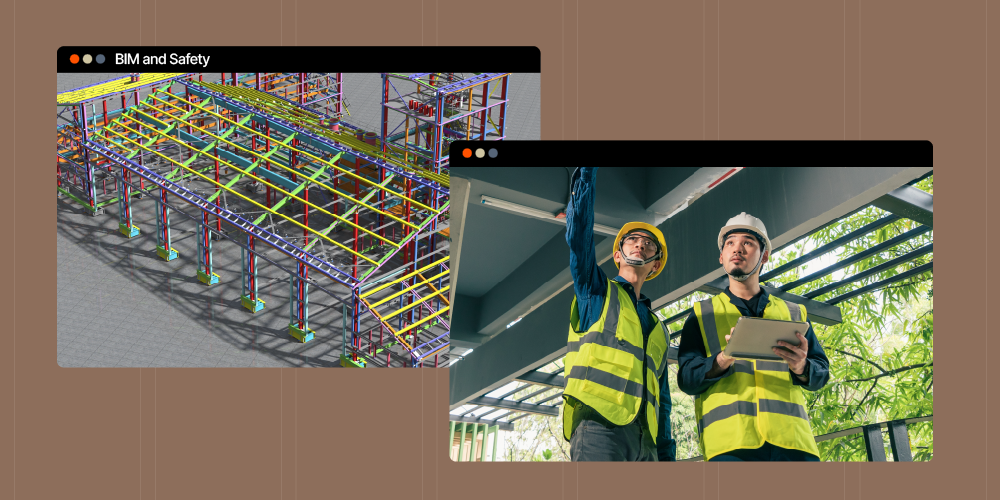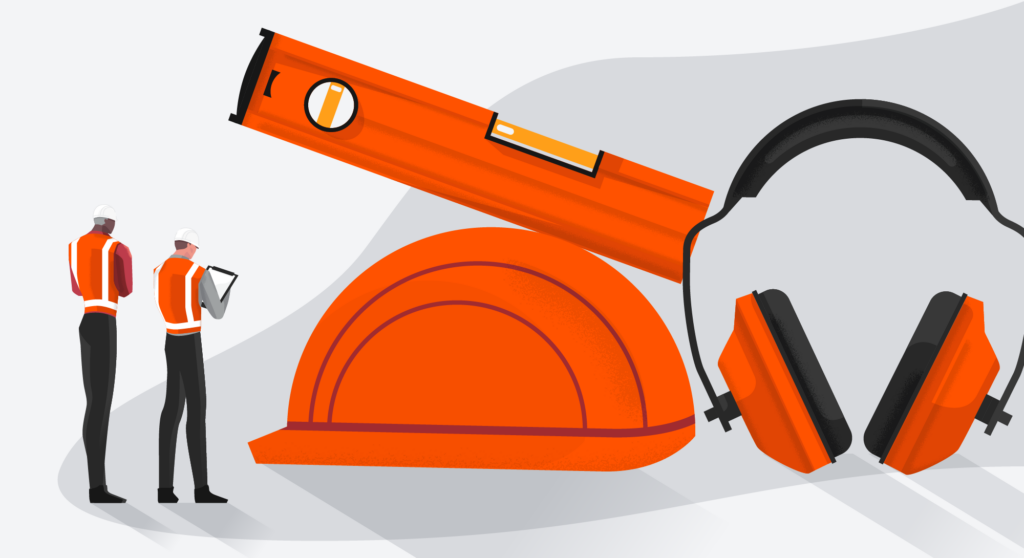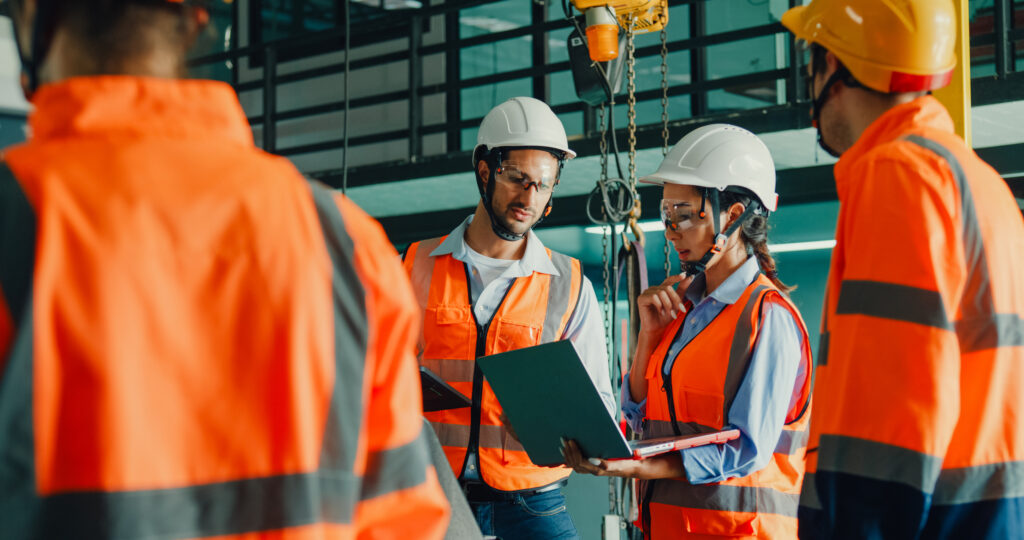— 7 min read
Construction Safety Officer: Duties & Requirements
Last Updated Sep 1, 2024
Last Updated Sep 1, 2024

Construction is an inherently risk field: When workers are operating heavy machinery, standing on scaffolding, handling hazardous materials, or working near powerlines, accidents can happen. To ƒprevent accidents and injuries, it’s important to implement the right safety precautions — including having a designated construction safety officer on site.
On most construction projects, a construction safety officer oversees all things safety-related, from conducting safety inspections to training workers on safety protocols and reporting accidents. Site safety officers are highly trained and are essential personnel on the job site. In this article, we’ll explore some of the specific duties safety officers are responsible for.
Table of contents
What does a safety officer do in construction?
A construction safety officer is responsible for maintaining a safe and efficient construction site. Their job is to prevent accidents and ensure that workers and the job site are in compliance with all relevant health and safety regulations.
Site safety officers typically work closely with the construction company’s CEO and other executives to make sure that safety-related goals are met. They are the boots on the ground that monitor job site safety at every stage of the project.
Under the umbrella of job site safety, construction safety officers take on many roles. Below are some specific construction safety officers’ duties.
Compliance and safety regulations
One of the biggest responsibilities of a construction safety officer is to make sure the job site is in compliance with all safety regulations. For example, if workers are doing a confined space entry, the safety officer would make sure that OSHA’s confined space entry procedures are followed, and that the correct PPE is used.
Risk assessment and developing safety protocols
Safety officers identify risks on the job site and create safety protocols based on those risks. For instance, a safety officer might designate an appropriate area for tool storage to limit the risk of a worker tripping and getting injured. Or, if workers are handling hazardous materials, the safety officer might create a set of safety procedures to limit harmful exposure.
Site safety inspections
Safety inspections are an important part of any construction project, and the construction safety officer is typically responsible for conducting these inspections throughout the project. In addition to daily, weekly, or monthly site inspections, safety officers may also inspect things like tools, machinery and equipment, first aid kits, fire extinguishers, and PPE.
Learn more: Mastering the Construction Safety Walk
Safety trainings and meetings
Depending on the project, workers may need to be trained on specific safety protocols or go through a safety orientation. Usually, the site safety officer is responsible for holding these training and safety meetings. This might also include safety stand-downs or emergency response drills, like evacuation procedures, cave-in rescues, or fires.
Read more on best practices to run an efficient construction safety stand-down
Prepare and submit reports
The construction safety officer is involved in every safety aspect on the job site, so they’re also responsible for writing and submitting safety reports. The officer may submit monthly, weekly, or even daily reports to company executives. These reports document potential safety hazards, what measures are taken to reduce risk, and if any safety incidents occurred.
Courses about construction.
For construction.
Unlock your career potential with our free educational courses on Health & Safety, Data in Construction, and more.
Recording safety incidents and concerns
If there’s an accident on the jobsite, the construction safety officer is in charge of documenting and reporting the incident. They also record safety concerns from workers or safety issues they see during their visual inspections of the job site. Officers are responsible for updating the safety plan if something goes wrong or an unknown risk is identified.
Implementing software
For construction companies that rely on software, the construction safety officer also oversees the use and implementation of the software for safety purposes. For example, they might submit daily logs on the platform so executives can easily access the findings. If there are multiple safety personnel on the site, using software like Procore’s Quality and Safety management tool makes it easy to centralize important information and access data and reports in real time.
Requirements to become a construction safety officer
There are two main ways to become a construction safety officer:
- Having direct experience in roles managing project safety or receiving formal safety education and training.
- On-the-job training through assisting safety personnel, or managing safety protocols and procedures for smaller companies that don’t have designated safety personnel.
With either route, construction safety officers must meet a series of requirements. This often involves educational prerequisites, relevant job site experience, and industry certifications. Below are some construction safety officer requirements that you must meet before you can take on this role.
- Educational background: If you want to get a job as a construction safety officer, you can get a degree in a safety-specific field. One of the most common degrees is in occupational health and safety, where you learn to manage worker safety on the job site.
- Industry certifications: Whether you receive a formal education or not, most construction safety officers in the U.S. get accredited through the Board of Certified Safety Professionals (BCSP). Through the BCSP, there are different tiers of safety certifications that officers can receive, which vary in terms of =difficulty and eligibility requirements. Some of the BCSP certifications include:
- Relevant experience and skills. Even if you have a formal safety education, it’s still important to have relevant industry experience and transferable skills. To become a construction safety officer, you will need to have at least a few years of experience working on construction job site safety and have a proven ability to manage all aspects of health and safety on large-scale projects.
- Problem solving. Being a construction safety officer involves quick thinking and problem-solving. For example, if you see a potential safety hazard, you need to take action as soon as possible, while also maintaining your other responsibilities. You also need to be tuned into everything that’s happening on the job site at a given moment in case there’s an accident.
- Continuing education and training. Continuing education and training are extremely important for construction safety officers. The industry is constantly changing, and safety personnel need to be current on the latest technology, policies, equipment/machinery, and best practices for job site safety.
Challenges construction safety officers face on the job
Being a construction safety officer can be a difficult job, and officers may face a variety of challenges. These are some of the biggest obstacles that construction safety officers can face when overseeing site safety:
- Limited budget: Some construction projects have limited budgets allocated for safety, which can put workers at risk.
- Limited time: Safety professionals have a lot of responsibilities. On a busy job site, it can be difficult for the officer to know what’s going on at all times.
- Enforcing compliance: Some experienced workers are steadfast in their ways and don’t want to buy into the correct safety precautions.
- Regulation changes: Safety regulations in the construction industry change often, and officers are responsible for understanding and implementing those changes as they come.
- Effective communication: Safety officers oversee entire construction teams, which involves building relationships with crews, communicating effectively, and enforcing safety rules.
- Mental health: Managing teams can be stressful. On top of that, construction safety officers need to get to know their teams and make sure they’re able to work safely and effectively if they’re going through a difficult time.
Check out these tips on managing stress in construction for additional help in providing a safer work environment for employees.
Every construction project requires safety personnel
Every construction project needs reliable and experienced safety personnel, like construction safety officers. These safety professionals play an essential role in keeping construction projects running smoothly while keeping workers safe and in compliance with regulations and legislation.
If you’re interested in becoming a construction safety officer, consider enrolling in a degree or training program. Here are some resources to help you get started:
this is part of the series
Construction Safety Basics
Was this article helpful?
Thank you for your submission.
100%
0%
You voted that this article was . Was this a mistake? If so, change your vote here.
Scroll less, learn more about construction.
Subscribe to The Blueprint, Procore’s construction newsletter, to get content from industry experts delivered straight to your inbox.
By clicking this button, you agree to our Privacy Notice and Terms of Service.
Categories:
Tags:
Written by
Clark Jensen
10 articles
Clark Jensen joined Procore as a Senior Strategic Product Consultant, Quality & Safety where he spearheads product knowledge education and executes product demonstrations. He brings several years of experience in roles both on and offsite as a former senior project safety manager for a general contractor in Salt Lake City, and a senior risk control consultant for a large U.S.-based insurance firm.
View profileElizabeth Rivelli
12 articles
Elizabeth Rivelli is a freelance writer specializing in insurance and finance. Her writing has been featured in dozens of publications, including Investopedia, The Balance, Forbes, Bankrate, NextAdvisor, and Insurance.com. Elizabeth holds a degree in Communication Studies from Northeastern University. She lives in New England.
View profileExplore more helpful resources

The Strategic Partnership Between Construction Safety and HR
A construction safety manager’s role is significant: It entails broad oversight over the construction workplace to prevent incidents that could cause worker injury or property damage. In addition to this...

Enhancing Construction Safety with BIM Technologies
The construction industry is no stranger to tools: Even ancient civilizations developed mallets and axes to make their work easier. Today’s latest tools look different, but they can be as instrumental...

Construction Safety Training – Goals, Benefits & Emerging Trends
Construction safety training (CST) educates workers about the risks they face on construction sites and teaches them how to prevent accidents, injuries and fatalities. The construction industry has the highest...

Technology for Construction Safety: Strategies to Supercharge and Scale Safety Practices
The construction industry is no stranger to the arrival of new technology, and builders are realizing its many benefits. Modernization across the industry is helping contractors streamline operations, enhance efficiency,...